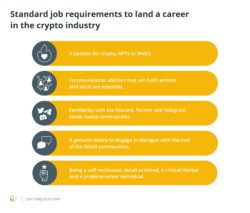How To Get A Job In The Web3 Space In 2023
Web3, also known as Web 3.0 or the decentralized web, refers to a vision and set of technologies that aim to transform the traditional internet into a more open, transparent, and user-centric ecosystem. Web3 represents a paradigm shift from the centralized nature of Web 2.0, where large corporations and intermediaries have significant control over users’ data and online experiences.
At its core, Web3 is built on the principles of decentralization, peer-to-peer networks, and blockchain technology. It envisions a web where individuals have greater ownership and control over their data, digital assets, and online identities. Web3 also aims to create a more trustless environment by leveraging cryptographic protocols and smart contracts to establish verifiable and tamper-proof transactions and interactions.
The key technologies that form the foundation of Web3 include:
1. Blockchain: Web3 relies on blockchain technology, which is a distributed and decentralized ledger that securely records transactions across multiple computers or nodes. Blockchains enable transparency, immutability, and trust by removing the need for intermediaries and central authorities.
2. Smart Contracts: Smart contracts are self-executing agreements with predefined rules and conditions encoded on a blockchain. They automatically enforce the terms of the contract, eliminating the need for intermediaries and ensuring trust and transparency in transactions.
3. Cryptography: Web3 utilizes cryptographic algorithms to secure data and enable privacy. Encryption techniques allow users to securely communicate and share information without compromising their privacy.
4. Decentralized Identifiers (DIDs): DIDs are a key component of Web3’s identity infrastructure. They enable individuals to have self-sovereign identities, meaning that users have full control over their personal information and can selectively share it with trusted parties.
5. Interoperability: Web3 emphasizes interoperability between different blockchain networks and applications. This allows users to seamlessly transfer assets and data across different platforms, fostering a more connected and inclusive web.
6. Distributed File Storage: Traditional web applications store data on centralized servers. In contrast, Web3 leverages distributed file storage systems like IPFS (InterPlanetary File System) that store data across multiple nodes, making it more resilient to censorship and single points of failure.
7. Consensus Mechanisms: Web3 employs various consensus mechanisms to validate and agree on the state of the blockchain. These mechanisms, such as Proof-of-Work (PoW) or Proof-of-Stake (PoS), enable trust and consensus among network participants without relying on a central authority.
The implications of Web3 are vast and have the potential to disrupt multiple industries, including finance, supply chain management, healthcare, governance, and more. By eliminating intermediaries, reducing costs, and empowering individuals, Web3 aims to create a more equitable and democratic internet ecosystem.
Examples of Web3 applications include decentralized finance (DeFi) platforms, which provide financial services without relying on traditional banks, decentralized social media platforms that prioritize user privacy and data ownership, and non-fungible token (NFT) marketplaces that enable the creation and trading of unique digital assets.
However, it’s important to note that Web3 is still an evolving concept, and the full realization of its potential is yet to be achieved. Technical challenges, scalability concerns, and regulatory frameworks are among the many factors that need to be addressed for the widespread adoption and success of Web3. Nonetheless, the movement towards a more decentralized and user-centric web is gaining momentum, and Web3 represents a promising vision for the future of the internet.
Why is Web3 so in demand?
Web3 is in high demand for several reasons, driven by the limitations and shortcomings of the current web infrastructure (Web 2.0) and the potential benefits offered by the decentralized web. The following factors contribute to the growing demand for Web3:
1. Data Ownership and Privacy: Web2.0 platforms often collect massive amounts of user data, which is then controlled and monetized by centralized entities. Web3 puts data ownership back into the hands of users, allowing them to have greater control over their personal information. With Web3, users can selectively share their data while maintaining privacy and control over how it is used.
2. Trust and Security: Centralized systems are susceptible to hacking, data breaches, and manipulation. Web3 leverages cryptography and decentralized networks, such as blockchains, to enhance security and establish trust without relying on intermediaries. The transparency and immutability of blockchain technology, along with decentralized consensus mechanisms, make Web3 applications more resistant to fraud and censorship.
3. Financial Inclusion and Decentralized Finance (DeFi): Web3 opens up new opportunities for financial inclusion by removing barriers and intermediaries in the traditional financial system. Decentralized Finance (DeFi) applications built on Web3 enable access to financial services such as lending, borrowing, and asset management for individuals who are underserved or unbanked. These applications operate autonomously, without the need for banks or other financial intermediaries.
4. User Empowerment and Control: Web3 empowers users by providing them with greater control over their online experiences. With self-sovereign identities and decentralized applications (dApps), individuals can manage their digital presence, control access to their personal information, and choose which services they engage with. Web3 puts the power back in the hands of users, reducing reliance on centralized platforms and giving individuals more agency over their online lives.
5. Interoperability and Open Standards: Web3 promotes interoperability between different blockchain networks and applications, allowing seamless transfer of assets and data across platforms. This interoperability fosters collaboration and innovation, as developers can leverage existing protocols and create integrated solutions that span multiple ecosystems. Open standards ensure that Web3 technologies can work together harmoniously, enabling a more connected and inclusive web.
6. Digital Asset Ownership and NFTs: Web3 facilitates the creation, ownership, and exchange of digital assets through the use of non-fungible tokens (NFTs). NFTs enable unique, verifiable ownership of digital assets such as art, collectibles, virtual real estate, and more. This has opened up new possibilities for creators, artists, and content producers to monetize their work directly, without relying on intermediaries or centralized platforms.
7. Governance and Transparency: Web3 introduces novel governance models that prioritize transparency, community participation, and decentralized decision-making. Through mechanisms like decentralized autonomous organizations (DAOs), stakeholders can actively participate in shaping the future direction of projects and platforms. This distributed governance fosters transparency and reduces the concentration of power in the hands of a few entities.
The demand for Web3 is fueled by a growing recognition of the limitations of Web2.0 and the desire for a more user-centric, secure, and open web. As individuals become more conscious of their data privacy, financial autonomy, and the need for transparent and inclusive systems, the demand for Web3 technologies and applications is likely to continue to rise.
Also read: Top 10 In-Demand Non-Tech Web3 Jobs
Top 10 jobs available in Web3 space
Web3 is the next generation of the internet, built on blockchain technology. It promises to be more decentralized, secure, and transparent than the current web. As a result, there is a growing demand for Web3 professionals in a variety of fields.
Here are the top 10 jobs available in the Web3 space:
- Blockchain Engineer
- Blockchain engineers are responsible for designing, developing, and maintaining blockchain platforms. They need to have a strong understanding of blockchain technology, as well as programming languages like Solidity and Golang.

- Smart Contract Developer
- Smart contract developers are responsible for writing the code that runs on blockchain platforms. They need to have a strong understanding of both blockchain technology and programming languages like Solidity.

- NFT Developer
- NFT developers are responsible for creating and minting non-fungible tokens (NFTs). They need to have a strong understanding of both blockchain technology and NFT standards like ERC-721 and ERC-1155.
- Data Scientist
- Data scientists are responsible for collecting, cleaning, and analyzing data on blockchain platforms. They need to have a strong understanding of both blockchain technology and data science techniques.
- UX Designer
- UX designers are responsible for designing user interfaces for blockchain platforms. They need to have a strong understanding of both blockchain technology and user experience design principles.
- Growth Hacker
- Growth hackers are responsible for growing the user base of blockchain platforms. They need to have a strong understanding of both blockchain technology and growth hacking techniques.
- Business Analyst
- Business analysts are responsible for understanding the needs of users and translating them into requirements for blockchain platforms. They need to have a strong understanding of both blockchain technology and business analysis techniques.
- Product Manager
- Product managers are responsible for the overall success of blockchain platforms. They need to have a strong understanding of both blockchain technology and product management principles.
- Community Manager
- Community managers are responsible for building and maintaining communities around blockchain platforms. They need to have a strong understanding of both blockchain technology and community management principles.
- Project Manager
- Project managers are responsible for the successful delivery of blockchain projects. They need to have a strong understanding of both blockchain technology and project management principles.
These are just a few of the many jobs available in the Web3 space. As the Web3 ecosystem continues to grow, the demand for Web3 professionals will only increase. So if you’re looking for a career in a cutting-edge field, Web3 is a great place to start.
There’s more jobs in Web3 than you think.
You just need to find them and demonstrate value.
As an NFT founder, these are the opportunities I see for people who want to go full time in Web3.
— 🇦🇺 Alex is Building (@AlexIsBuilding) June 15, 2023
How to get started in a Web3 career
If you’re interested in a career in Web3, there are a few things you can do to get started:
- Learn about blockchain technology. There are many resources available online and in libraries to help you learn about blockchain technology.
- Develop your coding skills. Many Web3 jobs require coding skills, so it’s important to develop your coding skills if you don’t already have them.
- Get involved in the Web3 community. There are many online and offline communities where you can meet other Web3 enthusiasts and learn more about the industry.
- Network with other Web3 professionals. Attending conferences, meetups, and other events is a great way to network with other Web3 professionals and learn about job opportunities.
Also read: Career in Web3- Top 10 Roles And Skills That Are In Demand
Skills Needed for a Web3 Job
As the adoption of Web3 technologies and applications continues to grow, the demand for professionals with specific skills in this domain is also increasing. Here are some key skills that are valuable for individuals seeking a career in Web3:
1. Blockchain Technology: A solid understanding of blockchain technology is essential for Web3 jobs. This includes knowledge of different blockchain platforms (such as Ethereum, Polkadot, or Solana), consensus mechanisms, smart contracts, and decentralized application development. Familiarity with blockchain tools and frameworks like Solidity, Truffle, or Web3.js is valuable for building and interacting with blockchain-based applications.
2. Cryptography: Proficiency in cryptography is crucial to ensure the security and privacy of Web3 applications. A strong grasp of cryptographic concepts, such as encryption, digital signatures, hash functions, and key management, is necessary. Knowledge of popular cryptographic algorithms and protocols, like RSA, ECC, SHA, and ZKP (Zero-Knowledge Proofs), is valuable for implementing secure solutions.
3. Web Development: Web3 jobs often require web development skills to build decentralized applications or integrate existing platforms with blockchain technology. Proficiency in programming languages like JavaScript, HTML, CSS, and frameworks such as React or Vue.js is essential. Understanding front-end development, user experience (UX) design, and responsive web design principles is valuable for creating user-friendly and intuitive interfaces.
4. Smart Contract Development: Smart contracts play a vital role in Web3 applications, so expertise in developing and auditing smart contracts is highly sought after. Proficiency in smart contract programming languages, particularly Solidity (used on Ethereum), is important. Understanding how to write secure, efficient, and well-audited smart contracts is crucial to avoid vulnerabilities and ensure the reliability of decentralized applications.
5. Decentralized Finance (DeFi): DeFi has emerged as a prominent sector within Web3, and having knowledge of DeFi protocols, concepts, and platforms is beneficial. Understanding concepts like lending, borrowing, yield farming, decentralized exchanges (DEXs), liquidity pools, and token standards (such as ERC-20 or ERC-721) is important. Familiarity with DeFi platforms like Uniswap, Compound, or MakerDAO is valuable for developing DeFi applications or integrating existing solutions.
6. Interoperability and Web3 Standards: Web3 aims for interoperability between different blockchain networks and applications. Familiarity with blockchain interoperability protocols like Polkadot, Cosmos, or Chainlink, as well as knowledge of web3 standards like JSON-RPC and GraphQL, is valuable for building cross-chain applications and integrating various components of the Web3 ecosystem.
7. Security and Auditing: With the decentralized nature of Web3, security is paramount. Understanding common security vulnerabilities in blockchain and decentralized applications, such as reentrancy attacks, front-running, or oracle exploits, is essential. Skills in conducting security audits and implementing best practices to mitigate risks are highly valuable.
8. Distributed Systems and Networking: Web3 often involves working with distributed systems, peer-to-peer networks, and distributed file storage systems like IPFS. Familiarity with concepts like distributed consensus, distributed ledger technology, networking protocols, and peer discovery mechanisms is beneficial for building scalable and resilient Web3 applications.
9. Governance and DAOs: Web3 places an emphasis on decentralized governance models and the use of decentralized autonomous organizations (DAOs). Understanding the principles of decentralized governance, token economics, voting mechanisms, and community engagement is important for participating in or building decentralized governance systems.
10. Adaptability and Continuous Learning: Web3 is a rapidly evolving field, so being adaptable and willing to learn new technologies, protocols, and frameworks is crucial. Keeping up with the latest trends, attending industry events, participating in hackathons, and engaging with the Web3 community can enhance your skills
and expand your professional network.
It’s important to note that Web3 is an interdisciplinary field that brings together elements of blockchain, cryptography, economics, and computer science. Having a well-rounded understanding of these domains, along with a passion for decentralization and the principles of Web3, can greatly enhance your prospects in the job market. Continuous learning, staying updated with industry developments, and gaining hands-on experience through personal projects or collaborations will help you thrive in the Web3 job market.
How to Get a Web3 Job?
If you’re interested in pursuing a career in Web3 and securing a job in this field, here are some steps you can take to increase your chances of success:
1. Acquire Relevant Knowledge and Skills: Start by building a strong foundation in Web3 technologies and concepts. Invest time in learning about blockchain technology, smart contracts, cryptography, decentralized finance (DeFi), and other related topics. Take online courses, attend workshops, join coding bootcamps, and explore educational resources specifically focused on Web3. Develop proficiency in programming languages like Solidity, JavaScript, or Rust, and gain hands-on experience with frameworks, tools, and platforms used in Web3 development.
2. Engage with the Web3 Community: Join online forums, communities, and social media groups dedicated to Web3 and blockchain. Participate in discussions, ask questions, and seek guidance from experienced professionals. Engaging with the community will not only expand your knowledge but also help you build connections with like-minded individuals and potential employers.
3. Build a Portfolio of Web3 Projects: Employers in the Web3 space value practical experience and evidence of your skills. Undertake personal projects that demonstrate your understanding of Web3 technologies. Create decentralized applications, develop smart contracts, or contribute to open-source Web3 projects. Building a portfolio showcases your abilities and can be a powerful asset when applying for Web3 jobs.
4. Attend Web3-related Events: Attend conferences, meetups, and hackathons focused on Web3 and blockchain technology. These events provide opportunities to network with industry professionals, learn about the latest trends and innovations, and potentially find job opportunities. Additionally, participating in hackathons can help you showcase your skills, collaborate with others, and gain visibility in the Web3 community.
5. Contribute to the Web3 Ecosystem: Get involved in open-source projects or contribute to existing Web3 platforms. Contributing code, documentation, or bug fixes to prominent Web3 projects not only enhances your skills but also demonstrates your commitment and passion for the field. Active contribution to the ecosystem can also attract the attention of potential employers.
6. Leverage Online Job Platforms and Networks: Utilize online job platforms and networks that specialize in Web3 and blockchain job opportunities. Websites like Ethlance, Gitcoin, or ConsenSys Job Board specifically cater to Web3 job postings. Additionally, join LinkedIn groups, follow relevant Twitter accounts, and engage with Web3-focused recruiters or talent acquisition professionals.
7. Showcase Your Expertise Online: Create an online presence that highlights your knowledge and skills in Web3. Maintain an up-to-date LinkedIn profile and consider building a personal website or blog where you can share your insights, projects, and expertise. Participate in relevant discussions on social media platforms, contribute to community forums, and share your thoughts on Web3-related topics. Demonstrating your expertise online can attract potential employers and establish you as a credible candidate in the Web3 field.
8. Stay Informed and Adapt: Web3 is a rapidly evolving field, so staying updated with the latest trends, protocols, and developments is crucial. Subscribe to newsletters, follow influential Web3 blogs and publications, and attend virtual conferences or webinars. Adapting to new technologies and industry changes will not only enhance your knowledge but also make you a valuable asset in the job market.
9. Seek Internship or Apprenticeship Opportunities: Consider applying for internship or apprenticeship positions in Web3-focused companies or startups. These opportunities provide valuable hands-on experience, mentorship, and a chance to learn from industry experts. Internships can also serve as a stepping stone to a full-time job in the Web3 space.
10. Network and Connect: Networking is essential in any job search, and the Web3 industry is no exception. Attend industry events, join relevant online communities
, and reach out to professionals working in Web3. Seek informational interviews, connect with potential mentors, and build relationships with individuals who can provide guidance and potentially refer you to job opportunities.
Remember that the Web3 job market is competitive, so perseverance, continuous learning, and a genuine passion for the technology are key. By acquiring the necessary skills, building a portfolio, engaging with the Web3 community, and actively pursuing job opportunities, you can increase your chances of securing a fulfilling career in the Web3 field.
Also read: The Top 10 Web3 Companies That Are Making The Web3 Future Bright
Future of Web3
The future of Web3 holds great potential for transforming the way we interact, transact, and share information on the internet. Here are some key aspects that may shape the future of Web3:
1. Decentralization and User Empowerment: Web3 aims to shift power from centralized entities to individuals. In the future, we can expect a web where users have greater control over their data, digital identities, and online experiences. Self-sovereign identities will become more prevalent, giving individuals the ability to manage and selectively share their personal information. Users will have increased ownership over their digital assets and be able to transact directly with others without intermediaries.
2. Interoperability and Cross-Chain Connectivity: Web3 envisions a future where different blockchain networks and decentralized applications can seamlessly interact and share information. Interoperability protocols and frameworks will enable the transfer of assets and data across various blockchains, fostering collaboration and creating a more connected ecosystem. This cross-chain connectivity will unlock new possibilities for innovation, scalability, and user experience.
3. Web3 Standards and Infrastructure: As Web3 continues to evolve, we can expect the development of standardized protocols, frameworks, and infrastructure to support the decentralized web. These standards will enhance interoperability, security, and usability across different Web3 applications and platforms. Improved infrastructure, including scalable blockchain solutions and decentralized storage systems, will address current limitations and enable broader adoption of Web3 technologies.
4. Decentralized Finance (DeFi): DeFi has already gained significant traction within the Web3 ecosystem, and its future looks promising. We can expect the continued growth of decentralized financial applications, offering a wide range of services such as lending, borrowing, asset management, insurance, and more. DeFi will enable financial inclusion, providing access to financial services for individuals around the world, including those who are currently underserved by traditional financial institutions.
5. Web3 for Governance and Public Services: Web3 technologies have the potential to revolutionize governance systems and public services. Decentralized governance models, powered by blockchain-based voting mechanisms and DAOs, can facilitate more transparent and participatory decision-making processes. Smart contracts can automate and improve the efficiency of public services such as land registration, supply chain management, and identity verification, reducing bureaucracy and corruption.
6. Enhanced Privacy and Security: Web3 aims to address privacy concerns by providing individuals with greater control over their personal data. Encryption techniques and privacy-preserving technologies will become more prevalent, ensuring secure communication and data protection. Zero-knowledge proofs and other advanced cryptographic methods will enable verifiable yet anonymous transactions, enhancing privacy while maintaining transparency.
7. Tokenization and Digital Assets: The tokenization of real-world assets and the creation of digital assets will continue to flourish in the Web3 era. Non-fungible tokens (NFTs) have gained significant attention, allowing unique digital assets to be bought, sold, and traded securely. We can expect further developments in tokenized assets, including art, collectibles, virtual real estate, intellectual property, and more, creating new economic opportunities and digital ecosystems.
8. Artificial Intelligence and Web3 Integration: The integration of artificial intelligence (AI) technologies with Web3 has the potential to unlock new capabilities and applications. AI algorithms can be deployed on decentralized networks, preserving data privacy while leveraging the power of distributed computing. AI-driven smart contracts and oracles can automate decision-making processes, enabling more efficient and autonomous systems.
9. Ethical Considerations and Sustainability: As Web3 technologies continue to evolve, ethical considerations and sustainability will become increasingly important. Efforts will be made to address energy consumption issues associated with blockchain networks and to ensure that Web3 applications and platforms prioritize inclusivity, fairness, and the well-being of users. Decentralized governance will play a crucial role in shaping ethical standards and guidelines for the Web3 ecosystem.
10. Mass Adoption and User Experience: The future of Web3 depends on its ability to achieve widespread adoption and provide seamless user experiences. The development of intuitive interfaces, improved scalability, reduced transaction costs, and enhanced usability will be key factors in driving mass adoption of Web3 applications. Education and awareness campaigns will help individuals understand the benefits of Web3 and empower them to embrace the decentralized web.
It’s important to note that the future of Web3 is still being shaped, and the above predictions are speculative. The actual trajectory will depend on technological advancements, regulatory frameworks, societal acceptance, and the collective efforts of the Web3 community.
Stay informed with daily updates from Blockchain Magazine on Google News. Click here to follow us and mark as favorite: [Blockchain Magazine on Google News].
Get Blockchain Insights In Inbox
Stay ahead of the curve with expert analysis and market updates.
latest from tech
Disclaimer: Any post shared by a third-party agency are sponsored and Blockchain Magazine has no views on any such posts. The views and opinions expressed in this post are those of the clients and do not necessarily reflect the official policy or position of Blockchain Magazine. The information provided in this post is for informational purposes only and should not be considered as financial, investment, or professional advice. Blockchain Magazine does not endorse or promote any specific products, services, or companies mentioned in this posts. Readers are encouraged to conduct their own research and consult with a qualified professional before making any financial decisions. The featured image used is just a creative depiction of the title and it does not intend to hurt sentiments of any person or institution. If it hurts anyone sentiments, please do not hesitate to reach out to Blockchain Magazine.

 Bitcoin
Bitcoin  Ethereum
Ethereum  Tether
Tether  XRP
XRP  Solana
Solana  USDC
USDC  Dogecoin
Dogecoin  Cardano
Cardano  Lido Staked Ether
Lido Staked Ether  TRON
TRON  Wrapped Bitcoin
Wrapped Bitcoin  Chainlink
Chainlink  Wrapped stETH
Wrapped stETH  Avalanche
Avalanche  Sui
Sui  Stellar
Stellar  Toncoin
Toncoin  Shiba Inu
Shiba Inu  Hedera
Hedera  LEO Token
LEO Token  Hyperliquid
Hyperliquid  Litecoin
Litecoin  Bitget Token
Bitget Token  WETH
WETH  USDS
USDS  Polkadot
Polkadot  Bitcoin Cash
Bitcoin Cash  Ethena USDe
Ethena USDe  Wrapped eETH
Wrapped eETH  Uniswap
Uniswap  MANTRA
MANTRA  Ondo
Ondo  Monero
Monero  Pepe
Pepe  WhiteBIT Coin
WhiteBIT Coin  Aave
Aave  NEAR Protocol
NEAR Protocol  Mantle
Mantle  Official Trump
Official Trump  Aptos
Aptos  Dai
Dai  Internet Computer
Internet Computer  Ethereum Classic
Ethereum Classic  Bittensor
Bittensor  OKB
OKB  Cronos
Cronos  POL (ex-MATIC)
POL (ex-MATIC)  Gate
Gate 







